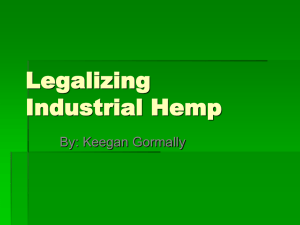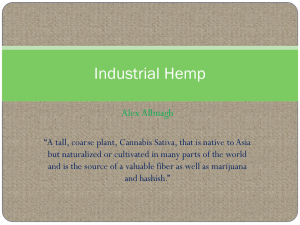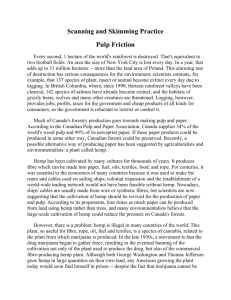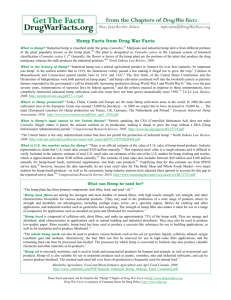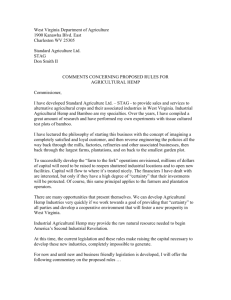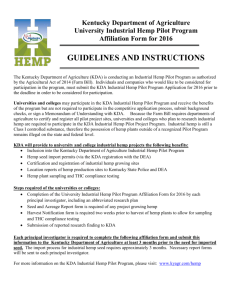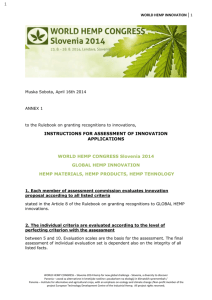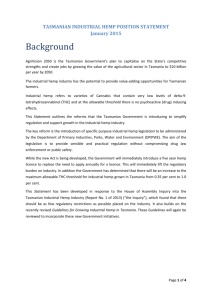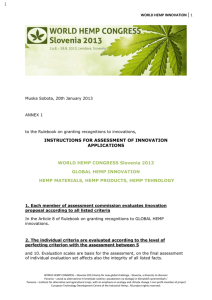A resolution urging Congress to recognize industrial
advertisement
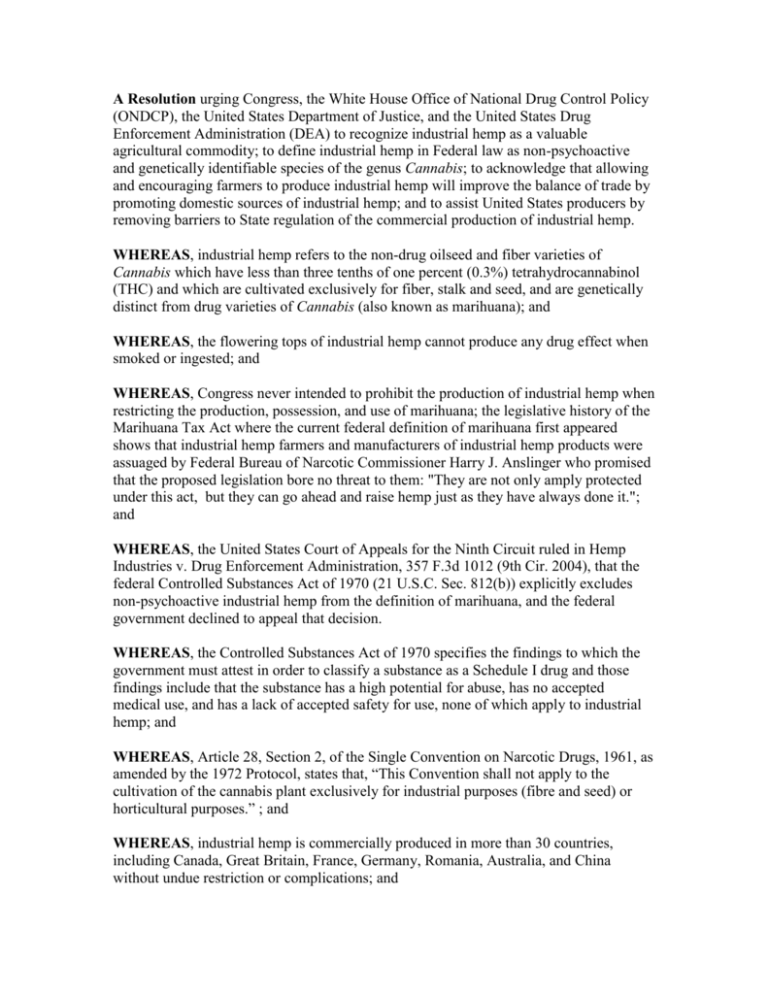
A Resolution urging Congress, the White House Office of National Drug Control Policy (ONDCP), the United States Department of Justice, and the United States Drug Enforcement Administration (DEA) to recognize industrial hemp as a valuable agricultural commodity; to define industrial hemp in Federal law as non-psychoactive and genetically identifiable species of the genus Cannabis; to acknowledge that allowing and encouraging farmers to produce industrial hemp will improve the balance of trade by promoting domestic sources of industrial hemp; and to assist United States producers by removing barriers to State regulation of the commercial production of industrial hemp. WHEREAS, industrial hemp refers to the non-drug oilseed and fiber varieties of Cannabis which have less than three tenths of one percent (0.3%) tetrahydrocannabinol (THC) and which are cultivated exclusively for fiber, stalk and seed, and are genetically distinct from drug varieties of Cannabis (also known as marihuana); and WHEREAS, the flowering tops of industrial hemp cannot produce any drug effect when smoked or ingested; and WHEREAS, Congress never intended to prohibit the production of industrial hemp when restricting the production, possession, and use of marihuana; the legislative history of the Marihuana Tax Act where the current federal definition of marihuana first appeared shows that industrial hemp farmers and manufacturers of industrial hemp products were assuaged by Federal Bureau of Narcotic Commissioner Harry J. Anslinger who promised that the proposed legislation bore no threat to them: "They are not only amply protected under this act, but they can go ahead and raise hemp just as they have always done it."; and WHEREAS, the United States Court of Appeals for the Ninth Circuit ruled in Hemp Industries v. Drug Enforcement Administration, 357 F.3d 1012 (9th Cir. 2004), that the federal Controlled Substances Act of 1970 (21 U.S.C. Sec. 812(b)) explicitly excludes non-psychoactive industrial hemp from the definition of marihuana, and the federal government declined to appeal that decision. WHEREAS, the Controlled Substances Act of 1970 specifies the findings to which the government must attest in order to classify a substance as a Schedule I drug and those findings include that the substance has a high potential for abuse, has no accepted medical use, and has a lack of accepted safety for use, none of which apply to industrial hemp; and WHEREAS, Article 28, Section 2, of the Single Convention on Narcotic Drugs, 1961, as amended by the 1972 Protocol, states that, “This Convention shall not apply to the cultivation of the cannabis plant exclusively for industrial purposes (fibre and seed) or horticultural purposes.” ; and WHEREAS, industrial hemp is commercially produced in more than 30 countries, including Canada, Great Britain, France, Germany, Romania, Australia, and China without undue restriction or complications; and WHEREAS, American companies are forced to import millions of dollars worth of hemp seed and fiber products annually from Canada, Europe, and China, thereby effectively denying American farmers an opportunity to compete and share in the profits; and WHEREAS, nutritious hemp foods can be found in grocery stores nationwide and strong durable hemp fibers can be found in the interior parts of millions of American cars; and WHEREAS, buildings are being constructed using a hemp and lime mixture, thereby sequestering carbon; and WHEREAS, retail sales of hemp products in this country are estimated to be over $452 million annually; and WHEREAS, industrial hemp is a high-value low input crop that is not genetically modified, requires little or no pesticides, can be dry land farmed, and uses less fertilizer than wheat and corn. WHEREAS, the reluctance of the United States Drug Enforcement Administration to permit industrial hemp farming is denying agricultural producers in this country the ability to benefit from a high-value, low-input crop, which can provide significant economic benefits to producers and manufacturers; and WHEREAS, the United States Drug Enforcement Administration has the authority under the Controlled Substances Act to allow this state to regulate industrial hemp farming under existing laws and without requiring individual federal applications and licenses; NOW, THEREFORE, BE IT RESOLVED: That the legislature urges the Congress of the United States to recognize industrial hemp as a valuable agricultural commodity; to define industrial hemp in Federal law as non-psychoactive and genetically identifiable species of the genus Cannabis; to acknowledge that allowing and encouraging farmers to produce industrial hemp will improve the balance of trade by promoting domestic sources of industrial hemp; and to assist United States producers by removing barriers to State regulation of the commercial production of industrial hemp; (these items may be taken care of by passing the Industrial Hemp Farming Act in the House and Senate) and BE IT FURTHER RESOLVED, That the legislature also urges the United States Drug Enforcement Administration to allow the State to regulate industrial hemp farming under existing state laws and regulations, or those to be passed, without requiring federal applications, licenses, or fees; and BE IT FURTHER RESOLVED, that the Secretary of State forward copies of this resolution to the President of the United States, the Attorney General of the United States, the Administrator of the United States Drug Enforcement Administration, the Director of the Office of National Drug Control Policy, the United States Secretary of Agriculture, and to each member of the state’s Congressional Delegation.
